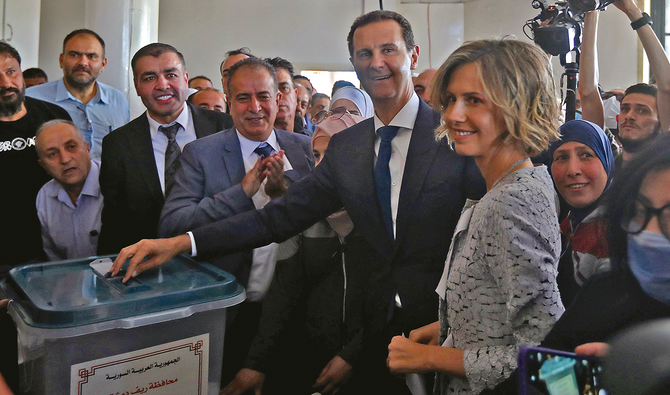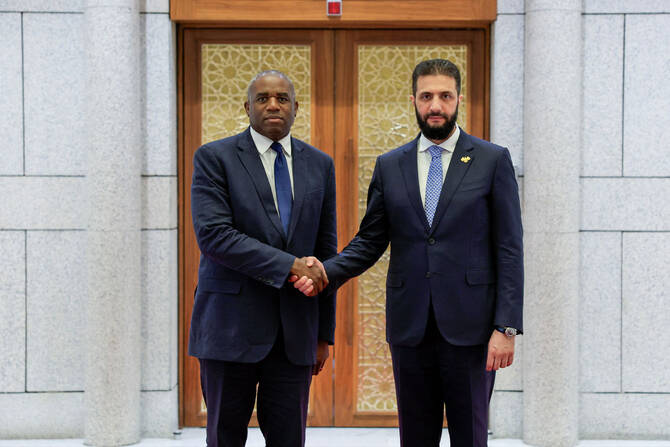Ephrem Kossaify
NEW YORK: Wednesday’s presidential election in Syria was a “charade” and a “grotesque joke,” according to the UK’s representative on the UN Security Council. Other members described the poll as “null and void” and “an insult to democracy.”
The comments came as Geir Pedersen, the UN’s special envoy for Syria, briefed the council on the latest developments in the country.
He reiterated that the election failed to meet the requirements of UN Resolution 2254, which calls for free and fair, UN-supervised elections conducted in accordance with a new constitution “to the highest international standards of transparency and accountability,” and in which all Syrians, including refugees in other countries, can vote.
“The UN is not involved in (Wednesday’s) election and has no mandate to be,” Pedersen said. “The UN continues to stress the importance of a negotiated political solution in Syria to implement resolution 2254. This remains the only sustainable path to ending the conflict and the suffering of the Syrian people.”
In his update on the political and humanitarian situation in the war-torn country, the envoy said Syrians continue to endure great suffering “and the same pattern of events and dynamics month on month — a pattern which I fear is slowly inching Syrians toward an even deeper abyss.”
But he added that the solution is “unchanging” too.
“What is required is a Syrian-led and owned political solution, facilitated by the United Nations and backed by constructive international diplomacy,” he said.
He reminded the 15-member council of the work that needs to be done to achieve a lasting nationwide ceasefire, to combat terrorism through a cooperative approach that upholds international law, and to intensify efforts to release detainees and abductees.
The dire humanitarian situation is another urgent issue, said Pedersen, exacerbated by severe water shortages and historically high food prices. He once again stressed the importance of the restoration of “full, sustained, and unimpeded humanitarian access to all parts of Syria.”
His comments were echoed by the UN’s humanitarian chief, Mark Lowcock, who warned that “the cross-border operation — which is a lifeline for more than 3 million people — cannot be substituted. We look to this council to ensure that that lifeline is not severed.”
Pedersen appealed for council members to reach a consensus about cross-border mechanisms and reauthorize the Bab al Salam and Yaroubiyah crossings for a further 12 months so that life-saving aid, which “remains essential to save lives,” can reach the millions of people who need it. The current resolution that applies to the crossings is due to expire in July.
Efforts continue to convene a sixth session of the Small Body of the Syrian Constitutional Committee in Geneva “as soon as clear understanding is in place,” Pedersen said.
He added that this needs to be “carefully prepared,” and must “restore and build some trust and confidence” and “produce results and continued progress on the committee’s mandate to prepare and draft for popular approval a constitutional reform.”
He added that constructive and comprehensive international diplomacy on Syria is essential “so that all of the key stakeholders with the influence and authority to promote progress toward peace in Syria can be at the same table.”
He concluded by warning that “the broad contours of a political solution to the conflict are well understood by key stakeholders, yet none is willing to take the first step. If we continue like this, if key players are more invested in conflict management than conflict resolution, I fear that Syria will become another protracted conflict, lasting generations.”
While Russia’s representative on the Security Council condemned the criticism of Wednesday’s presidential poll, describing it as “disregard for Syrian voters,” the other members were united in rejecting the election.
Geraldine Byrne Nason, Ireland’s permanent representative to the UN, called on the Syrian regime to “end its intransigence, which is frustrating the work of the constitutional committee, and engage in meaningful negotiations.”
French envoy Nicolas de Riviere said: “This election is null and void and did not contribute to restoring any political legitimacy to the Assad regime. It is high time for the Syrian regime to commit itself to a political process under UN auspices.”
Jonathan Allen, the UK’s deputy ambassador to the UN, denounced the election as a “charade” and “an exercise” designed to sustain “Assad’s dictatorship, and does not even come close to meeting the requirements of Security Council Resolution 2254.”
In a comment clearly directed at Russia, he said: “Only countries which take a similar approach to their own people — depriving them of the opportunity to choose their leaders, denying them the right to participate freely in politics or even to speak their mind — will consider these to be ‘elections.’ And judging by the company the Syrian regime keeps here in the United Nations, those countries are already in the bag.
“For the rest of the UN’s membership, (the election) is a grotesque joke perpetrated by a man who has far worse crimes to answer for, having gassed, tortured and starved a people who still will not accept him as a legitimate leader.”
Richard Mills, the US deputy representative to the UN, denounced the election as “an insult to democracy and the people of Syria” and once again called on Syrian President Bashar Assad and Russia to adhere to the current ceasefire.
Expressing concern about the humanitarian crisis in the country, Mills warned that “if we do not reopen all border crossings people will die, it’s that simple.”






















